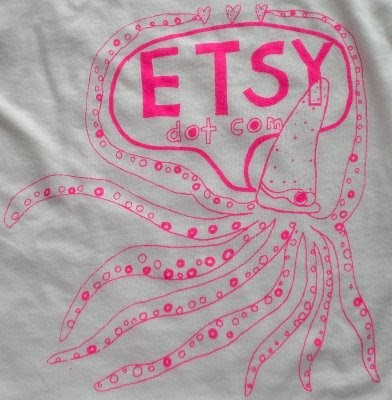
Etsy makes most of its money through by charging users to list goods and then a 3.5% sales fee

(Come mingle with hundreds of top venture capitalists representing $10B-plus in capital under management, including Khosla Ventures, Greylock and Javelin Venture Partners, and learn from founders/CEOs including Marco Zappacosta, Co-founder & CEO of Thumbtack and Adam Goldenberg, CEO of JustFab, Slava Rubin, Founder & CEO of Indiegogo, at Vator Splash Oakland on April 22nd and 23rd. Get your tickets here!)
My girlfriend and I recently celebrated our ninth anniversary. After looking through the cards at places like CVS and Walgreens, she told me that they everything she found was so terrible that she instead decided to look online.
The card she gave me was Etsy (it had a quote from Parks and Recreation, a show we both love). Even though it required no more effort than going to get a card at a store (actually even less so, since she didn't even have to leave the house to get it) there was something about the fact that it was unique and handmade of it that made it much cooler, and more special.
In short, I now understand the appeal of Etsy.
The peer-to-peer marketplace dedicated to selling handmade and vintage items, just went public this week, raising $287 million, seeing its stock soar over 87%, and in the process becoming the biggest ever tech exit for a company from New York.
So how does the company makes money? In two ways:
The first is marketplace revenue, where it charges users to list goods and then a percentage of the profit when they are sold. That includes a $0.20 listing fee for each item listed and a 3.5% fee for sales completed on the website.
The company made $195.59 million in revenue in 2014, up from $125 million in 2013 and $75.6 million in 2012. The majority of that money, $108.7 million, came from its marketplace,
It also makes money from its seller services including it advertising platform, direct checkout, payment processing and discounted shipping labels. The other $82.5 million of Etsy's 2014 revenue cames from these seller services.
At the same time, though, Etsy has seen its losses mount up as well: going up to $15.2 million, up from $2.3 million in 2012. In 2013 its net loss went all the way down to just $796,000 before jumping back up in 2014. The main drag on its revenue is coming from general and administrative costs, which were nearly $52 million in 2014. The company also spent $39.7 million on marketing and $36.7 on product development.
E-commerce IPOs over the last few years have also been a mixed bag.
Zuliliy, for example, is currently trading at $14.50 a share, down from IPO price of $22. Home goods retailer Wayfair had an IPO price of $22, and is now trading at $32.17. And Alibaba, which is the largest IPO in history, is trading at $81.9 a share, up from an IPO price of $68.
Another e-commerce IPO is coming up, with Shopify having filed earlier this week.
Founded in June 2005 in Brooklyn, New York, Etsy raised over $97 million in venture capital funding from investors that included Glynn Capital Management, Index Ventures, Union Square Ventures, Accel Partners, Hubert Burda Media and Acton Capital Partners.
(Image source: blog.etsy.com)
Related News


Etsy raises $20M for some $300M valuation

Etsy sets IPO price range at $14 to $16

With $1.8B valuation, Etsy is biggest ever NY tech exit

